O P Gauba Summary: Concept of Development | Sociology Optional for UPSC (Notes) PDF Download
Meaning of Development
 Sustainable Progress
Sustainable Progress
- The concept of development originated in the social sciences to assist newly independent nations after World War II (1939-1945).
- Although development is a relatively recent idea, early notions of it can be found in the social theories of the 19th and early 20th centuries.
- Development is commonly understood as a transition from simple to complex forms, from less efficient to more efficient methods, or from ordinary to improved systems.
- It represents a process where a system or institution becomes stronger, more organized, more efficient, and more effective, thereby better meeting human needs and desires.
- Unlike progress, which involves moral judgment and normative standards, development can be measured objectively.
Characteristics of Development
- To understand development, we first identify the features of an advanced society and then analyze how a society moves from lower forms to higher ones.
- Development entails a purposeful effort to achieve a specific goal, and the state of society concerning this goal reflects its level of development.
- J.H. Mittelman defined development as the capacity to utilize natural and human resources effectively for societal objectives.
- Underdevelopment, in this context, refers to the obstacles hindering rational changes in social structures.
- Paul Baran similarly characterized development as a profound transformation of a society's economic, social, and political frameworks.
Development and Underdevelopment
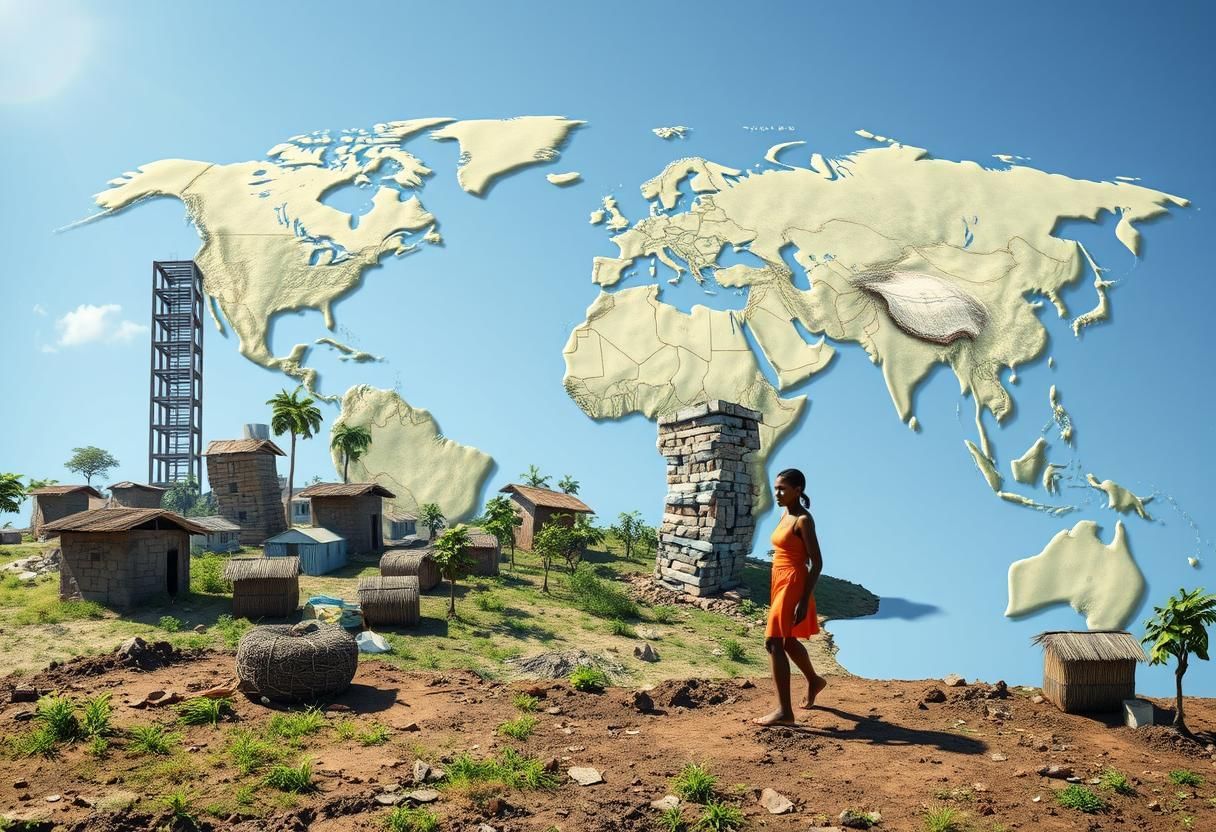 Economic Disparity
Economic Disparity
Walter Rodney explained that development is a complex process involving:
- Enhanced skills and capabilities
- Increased freedom, creativity, self-discipline, and responsibility
- Improved material well-being
People strive to utilize their natural and human resources efficiently to attain social objectives. This endeavor is called development, while factors hindering progress are referred to as underdevelopment.
Understanding Developing Countries
Development primarily pertains to developing countries, often labeled as the third world. These nations are predominantly found in:
- Asia
- Africa
- Latin America
They are characterized by:
- Lower levels of economic and political development compared to industrialized nations.
- A tendency to remain independent from both the capitalist world (the first world — Western Europe, the United States, Canada, Australia, and New Zealand) and the communist world (the second world — the former Soviet Union and Eastern European socialist countries).
- Most Asian and African nations gained political independence from colonial rule after the Second World War (1939-45).
- Latin American countries achieved formal independence from European colonial powers in the first half of the nineteenth century but remained underdeveloped due to economic dependence on the United States until the mid-twentieth century.
The term 'third world' is somewhat vague. Some European countries that are less developed face challenges similar to those of 'third world' nations but are not classified as such because they did not oppose the dominance of the first or second world.
In the Realm of International Politics
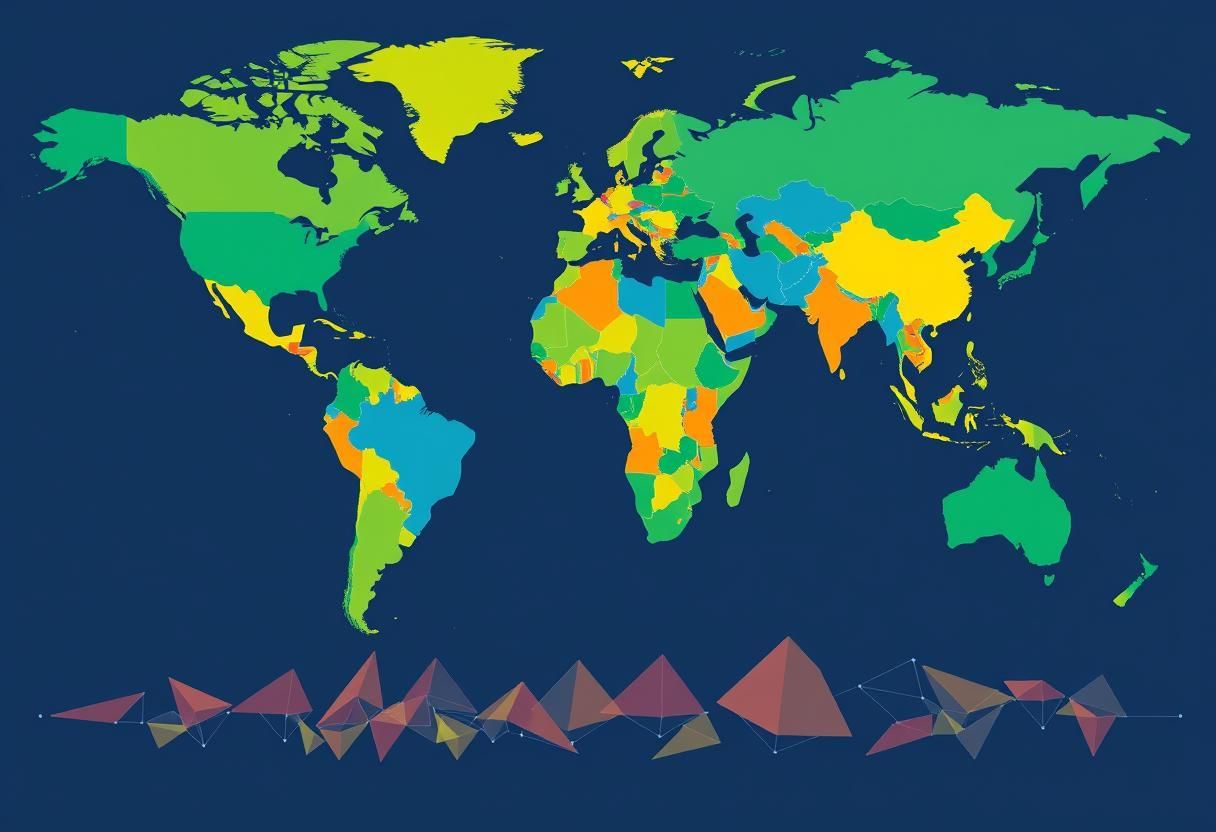 Geopolitical Revolution
Geopolitical Revolution
Third World countries have adopted a policy of non-alignment in international politics, refusing to join military alliances led by the superpowers of the capitalist and communist blocs. India is a prominent leader among these countries. While they do not form a separate bloc against the capitalist and former communist blocs, Third World countries aim to maintain close coordination for mutual cooperation and to voice their concerns against domination and exploitation by industrially advanced nations.
Challenges and Potential
- Despite facing significant challenges in socio-economic and political development, Third World countries represent a vast majority of the world’s population and sovereign states.
- If they unite and act together, these countries are likely to play a crucial role in shaping the future of world politics.
Origin of the Term 'Third World'
The term 'third world' was coined by the French economist and demographer Alfred Sauvy in 1952. Sauvy drew a parallel between the social hierarchy in pre-revolutionary France, which comprised the clergy, nobility, and commoners (known as the 'first estate', 'second estate', and 'third estate' ), and the contemporary global landscape.
Historical Context
- The term 'third world' aimed to signify a modern equivalent to the 'third estate.'
- Similar to the 'third estate,' the 'third world' was characterized by its numerical strength, exclusion from power, and potential for revolutionary change.
- Furthermore, 'third world' was perceived as representing a distinct social and economic system, different from capitalism in the 'first world' and socialism in the 'second world'.
Third World Countries
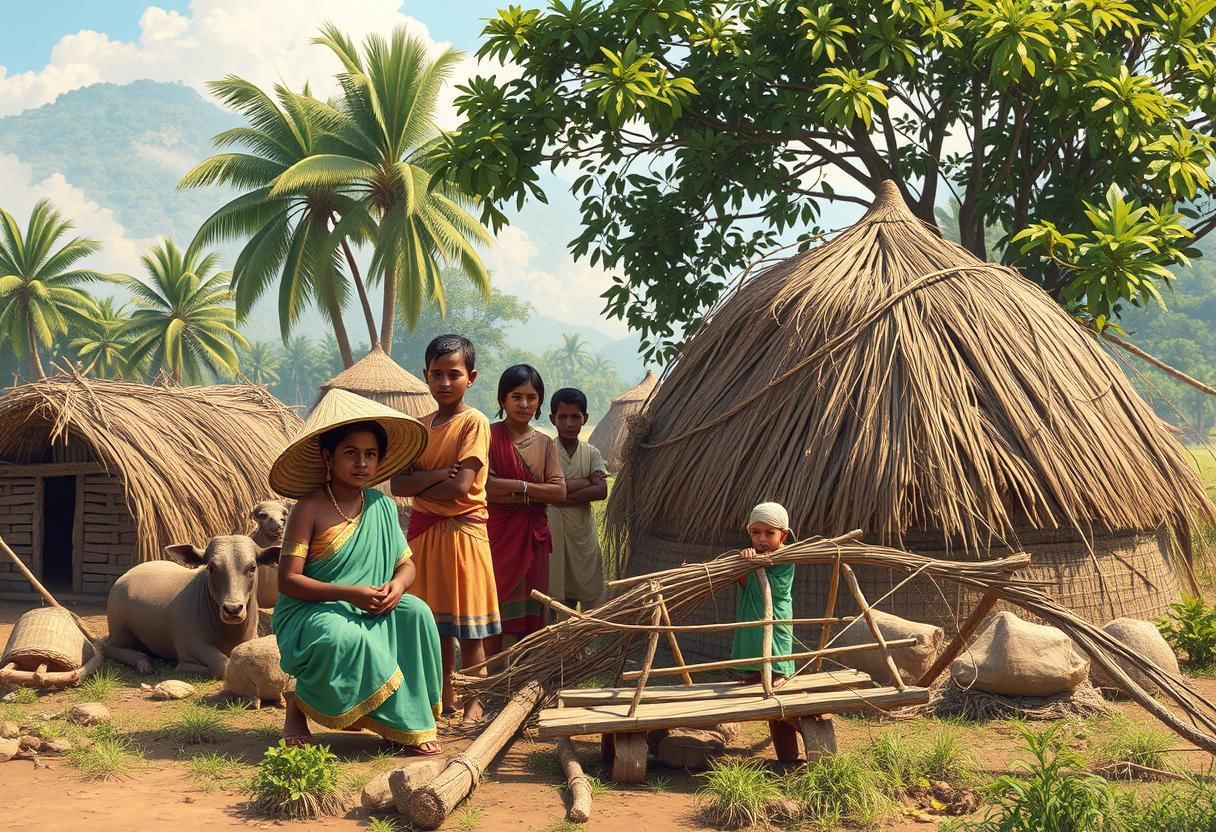 Colonial Legacy
Colonial Legacy
The term "third world" gained popularity in the 1950s. Today, there are over 120 countries in this group, making up more than two-thirds of the world's nations. These countries also account for about three-quarters of the global population. While they may have limited resources, their perspectives are important to the international community.
Common Characteristics
- Colonial Past and Resentment: These countries share a history of colonial rule, which has left them with feelings of resentment towards their former colonial powers and against imperialism in general.
- Recent Independence: Many Asian and African nations gained independence only recently, having been controlled by West European countries such as Great Britain, France, Belgium, Portugal, and Holland until after the Second World War. In Latin America, the focus of anger is on the imperialistic policies of the United States.
- Low Level of Development: The exploitation of their resources and people during colonial rule has resulted in these countries being at a very low level of development. This is reflected in several factors:
- Low Per Capita Income: The average income per person is low.
- Limited Access to Technology: There is a lack of access to modern technology.
- Rural Population: A large majority of the population, often 80 to 85 percent, lives in rural areas.
- Small Manufacturing Sector: A small portion of the population is employed in manufacturing industries.
- High Illiteracy Rates: Illiteracy rates are often above 50 percent.
- Few Educational Opportunities: There are limited educational opportunities, leading to a high level of educated unemployment.
- Poor Nutrition: Levels of nutrition are low, resulting in diseases and disabilities.
- Limited Medical and Health Facilities: There is a lack of adequate medical and health facilities.
The high birth rate and consequent population explosion continually threaten living standards and limit social mobility, among other issues.
 Dynamic change
Dynamic change
Politics, bureaucracy, and business in these countries are dominated by an educated elite, often a Western-educated elite. Meanwhile, the majority of the population often lacks opportunities to influence policy-making.
- A large number of these countries have faced repeated military dictatorship by overthrowing constitutional governments.
From Underdevelopment to Development
The developing countries of today inherited extremely backward economies at the time of their independence because their natural and human resources were heavily exploited during colonial rule.
Liberal and Marxist writers have provided different explanations for their underdevelopment and have suggested various paths for their development.
LIBERAL VIEW
The views of Western writers generally represent the liberal perspective on the issues of development and underdevelopment.
- This perspective suggests that all societies go through a series of stages of political development.
- It reflects a broader view of developmental stages, where primitive, traditional, or premodern societies eventually evolve into modern, industrialised societies.
- This implies that modern systems are more efficient in addressing state and societal issues, similar to how industrial systems are more effective than non-mechanised agricultural systems.
While a traditional political system mainly focuses on:
- Collecting taxes,
- Maintaining law and order,
- Defending the state.
In contrast, a modern system actively works to improve the quality of life for its citizens while performing the usual functions of government.
- In a traditional system, people are not involved in politics, and the government simply exercises power over them.
- Conversely, in a modern system, citizens engage closely in politics, regularly communicating their demands and opinions to the government.
- The government, in turn, depends on legitimacy to gain the support and cooperation of its people.
Liberal Models of Political Development
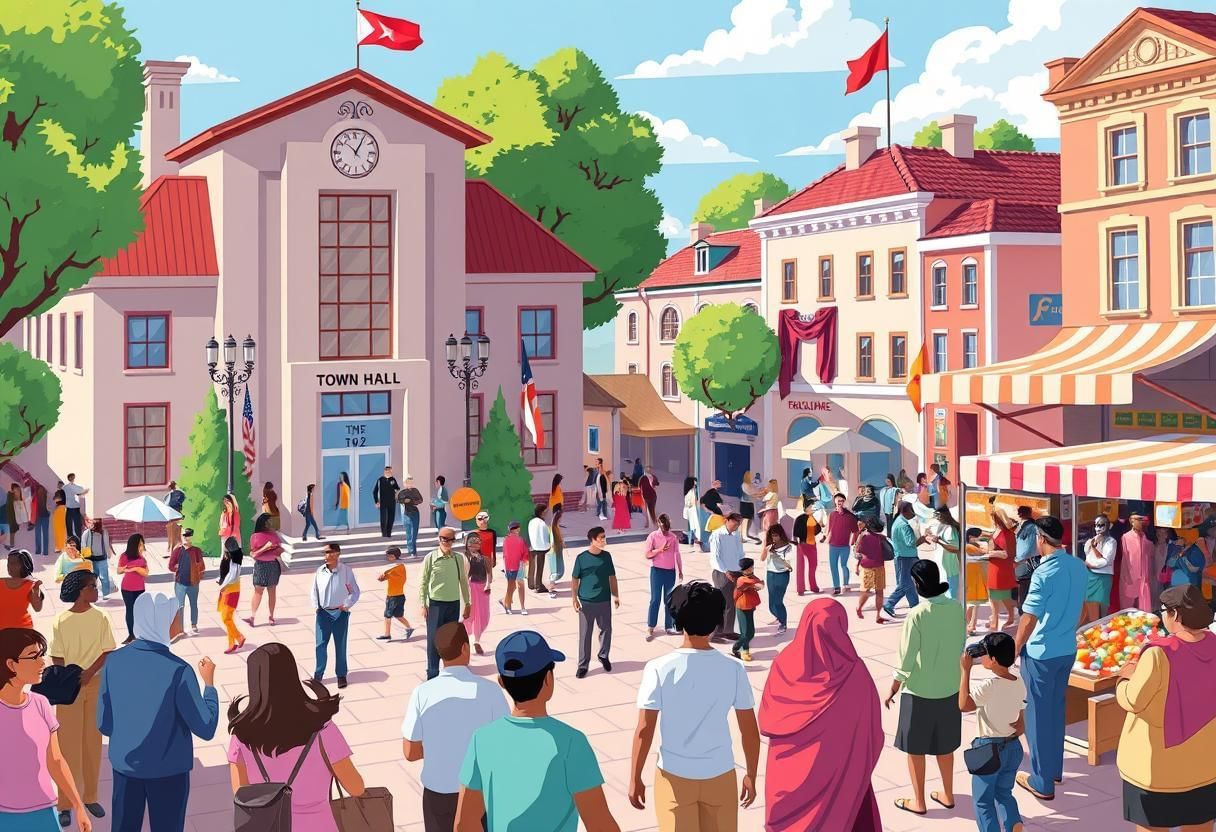 Democratic Progress
Democratic Progress
Liberal models of political development emphasize differentiation, which entails:
- Enhanced specialization of roles or a clear division of labor within society.
- A shift from loyalty to specific groups towards national loyalty.
- A transition from ascribed status (based on tradition) to achieved status (based on performance).
- The establishment of processes and institutions to facilitate these changes.
Western Perspectives on Development
Advocates of development and modernization in the West often perceive liberal democracy as the optimal model for developing nations to attain progress. This viewpoint has been emphasized by various theorists over time:
- James Bryce in Modern Democracies (1921) and Carl Friedrich in Constitutional Government and Democracies (1937) viewed political development as a progression toward liberal democracy.
- Gabriel Almond and James Coleman, in The Politics of the Developing Areas (1960), along with Almond and G.B. Powell in Comparative Politics: A Developmental Approach (1966), and Lucian Pye in Aspects of Political Development (1966), supported this perspective within a more technical framework.
These theorists suggested that new nations need to construct their political systems in tandem with their economies and social organizations, aligned with liberal democracy. Neglecting this alignment could result in ongoing backwardness. Additionally, it was suggested that third-world countries should maintain open economies to foster free trade and international competition, relying on a market economy for their overall development.
Marxist Perspective
 Colonial Struggles
Colonial Struggles
The Marxist perspective advocates for a confrontation with the capitalist world rather than mere imitation. V.I. Lenin, in his work *Imperialism: The Highest Stage of Capitalism* (1916), proposed that advanced capitalism exploits underdeveloped nations. He called upon these nations to adopt the role of the proletariat in the struggle against capitalism, aiming to inspire dependent countries to seek independence from colonial domination.
Development Path for Developing Nations
- Marxist and Neo-Marxist scholars argue that the capitalist path is not suitable for contemporary developing countries.
- They contend that the circumstances of today's developing nations are vastly different from those of Western countries during their early stages of development.
- Paul Baran, in *The Political Economy of Growth* (1957), observed that advanced capitalist nations built their wealth by exploiting their colonies.
- Currently, developing countries do not have access to such resources, and many local capitalists face challenges in enhancing their production capabilities.
- As a result, the capitalist route is unlikely to facilitate their progress.
National Capitalism in Latin America
- Andre G. Frank, in *Capitalism and Underdevelopment in Latin America* (1967), argued that national capitalism and the national bourgeoisie in Latin America cannot drive development in the same way as their counterparts did in England and the United States.
- Frank proposed a centre-periphery model to explain the impact of imperialism, likening the metropolis to the centre and the satellite to the periphery.
- He illustrated how development in the centre leads to underdevelopment in the periphery, a relationship that continues to persist even as peripheral nations strive for independence.
Political Independence and Dependency Theory
 Economic Liberation
Economic Liberation
To prevent the underdevelopment of newly independent nations, Frank suggested that they should be separated from capitalist economies. This idea was supported by Walter Rodney in his book How Europe Underdeveloped Africa and by B. Cumings in his article on the Northeast Asian political economy.
Integration and Exploitation
- Samir Amin argued that the relationship between industrialised and less developed countries prevents capitalism from advancing productive forces in underdeveloped nations.
- Dependency theory, developed by Marxist and Neo-Marxist scholars, explains underdevelopment as a result of external factors affecting the social and economic development of third world countries.
- Historically, these nations were colonies of advanced capitalist countries, and their exploitation contributed to their underdevelopment.
- The industrial growth of the first world was largely achieved through the exploitation of resources from current third world countries.
- Even after colonialism ended, advanced countries continued to exploit third world nations through unequal exchange in international trade.
This perspective represents a shift from the traditional Marxist view, which focused on domination and exploitation in terms of production forces and relationships.
Unequal Exchange
The concept of unequal exchange in international trade, as proposed by Marxist scholars, highlights the disparity in the value received for labor between developed and developing countries. Developed countries, due to their advanced technology and large-scale production, are able to extract a higher value for the labor involved in their products. In contrast, developing countries, with less advanced technology and smaller production scales, receive a lower value for their labor inputs.
Neo-Marxist Theory of Underdevelopment
 Economic Inequality
Economic Inequality
- The neo-Marxist theory of underdevelopment posits that the economic and political underdevelopment of developing nations is a result of their domination by the capitalist world, rather than a mere phase towards capitalism.
- Advanced industrial nations in the West are seen as having consistently contributed to the underdevelopment of these countries.
- Currently, underdeveloped nations are economically reliant on exporting primary products, such as raw materials and agricultural goods.
- The markets for these products are controlled by capitalist economies, leaving producing countries with little control over them.
- Industrially advanced countries invest in former colonies, utilizing them as suppliers of raw materials and labor at low costs.
- These countries also serve as potential markets for manufactured goods sold at regular market prices.
- As a result, former colonial powers continue to reap economic benefits without facing the political responsibilities associated with colonialism.
Liberal Theory and Third World Economies
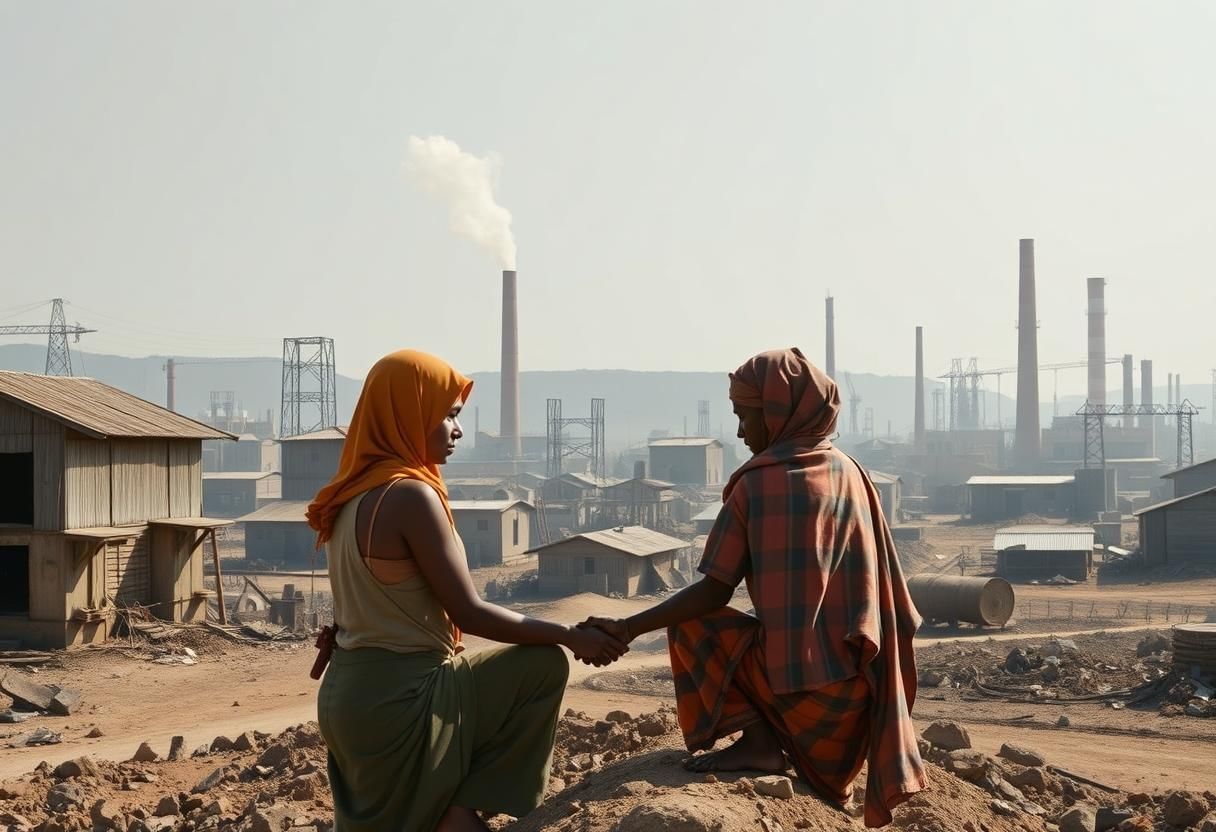 Economic Inequality
Economic Inequality
Liberal theory proposes that third world countries can escape poverty by integrating their economies with those of more developed nations. However, this notion is deemed misleading. Neo-Marxist thinkers contend that if these underdeveloped nations keep their economies open to free trade and international competition, the benefits will predominantly accrue to the wealthier nations, exacerbating the gap between rich and poor.
They advocate for raw material suppliers in the third world to form their own cartels to establish fair prices and prevent exploitation by developed countries. A prominent example of such a cartel is the Organization of Petroleum Exporting Countries (OPEC), established in 1960.
Conclusion
Dependency theory tackles the problem of neo-colonial exploitation that third world countries face. However, there is a need for solutions to address their various social, economic, and political challenges as well. Developing nations must adopt a united approach to confront their shared issues. One potential solution is south-south cooperation.
Nevertheless, an appropriate model for technological development is yet to be identified, which will necessitate reliance on developed countries. Furthermore, Western technology, designed for a wealthy and motivated small population, cannot be directly implemented in the larger, poorer, and less driven populations of third world nations. These countries need to combine borrowed technologies with local innovations to cater to the needs of their vast populations and generate job opportunities. The competitive nature of Western economies may not be suitable for the third world, which still retains some elements of communitarianism from its cultural heritage. However, fostering a certain level of competitive spirit is essential to motivate individuals.
Welfare programs are crucial in developing countries, but their design is important to ensure they promote the growth of human resources and talent. If not, there is a risk of creating dependence among the unskilled and lazy, which could demotivate capable and hardworking individuals. Moreover, developing nations cannot afford the same level of consumerism as seen in the West. It's also worth noting that the West, despite its material wealth, is facing a crisis of human values. In contrast, developing countries have the potential to blend material and spiritual values to tackle global issues impacting humanity.
Alternative Paths of Development
 Urban Development
Urban Development
Development is a complex process with no guaranteed method. Different schools of thought suggest various ways to achieve development, with four being particularly important:
- Market Society Model
- Welfare State Model
- Socialist Model
- Gandhian Model
Market Society Model
The market society model associates development with modernization and considers Western society as the ideal example. This implies that developing societies should adopt characteristics of Western societies to progress. According to James S. Coleman, a modern society typically exhibits:
- High urbanization
- Widespread literacy
- High per capita income
- Social and geographical mobility
- Strong commercialization and industrialization
- Extensive mass communication networks
- Active participation of members in social and economic activities
These features suggest that the modernization of developing societies may lead to their Westernization. Politically, this model advocates for the establishment of liberal democratic structures. Economically, it supports a competitive market system, and socially, it promotes equality of opportunity and merit.
Advocates of the Market Society Model
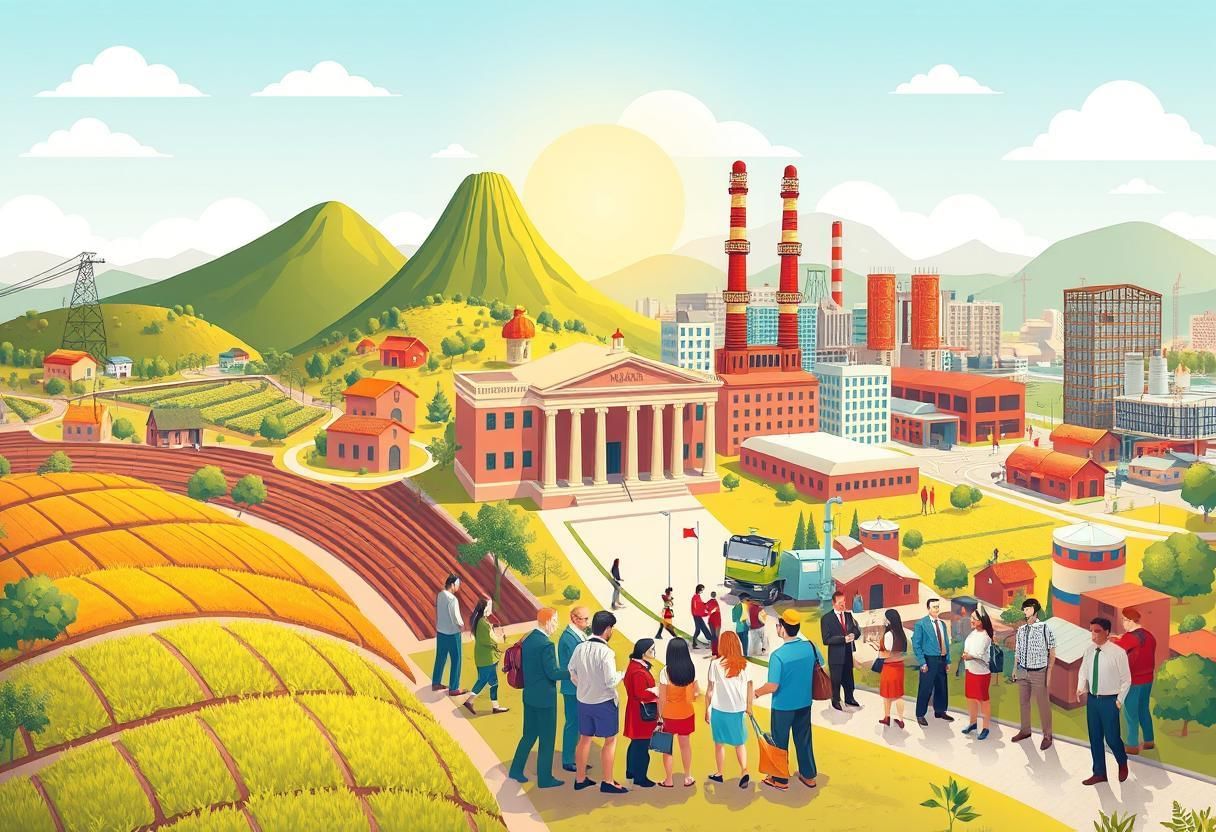 Development Dynamics
Development Dynamics
Supporters of the market society model view economic growth as crucial for development. They argue that each country must pass through various stages of economic growth before achieving abundance. W.W. Rostow, in his book The Stages of Economic Growth: A Non-Communist Manifesto (1960), presents a five-stage model based on economic conditions:
- Traditional stage: Characterized by low technology and a heavy reliance on manual labor in agriculture.
- Transitional stage: Involves preparing for take-off through technological advancements.
- Take-off stage: Marks the beginning of self-sustaining economic growth when barriers to industrialization are removed and entrepreneurs emerge.
- Drive to maturity: Occurs when industrialization has begun, accompanied by increased technological development and productivity.
- High level of mass consumption: When society moves beyond basic needs to widespread consumption of durable goods.
A.F.K. Organski's Viewpoint
A.F.K. Organski, in The Stages of Political Development (1965), linked economic growth with political development. He proposed four stages:
- Primitive unification
- Industrialization
- National welfare
- Politics of abundance
These theories imply that developing countries should mimic capitalist nations to achieve growth. However, Andre Gunder Frank challenges this idea in Sociology of Development and Underdevelopment (1971). He contends that in Western societies, underdevelopment arises from historical, economic, and social factors. In contrast, for developing nations, underdevelopment results from European capitalist expansion. This raises the question of how they can follow the same development path when their starting points are so different.
Additionally, the market society model does not align with the essence of communitarianism, which has historically invigorated developing societies. These societies have managed to combat their material poverty with a strong sense of social solidarity. The individuals in these communities often experience a feeling of compassion for their neighbors, visitors, and those in desperate need. In contrast, the market society thrives on competition, where self-interest takes precedence. Within a market society, all responsibilities are defined by mutual interests, and even common interests are viewed as a collection of individual self-interests. If developing societies were to adopt this model, it could potentially weaken the bonds that hold their social fabric together.
In a market society, the primary focus is on the maximization of profit. This encompasses higher education, art, and culture, all of which are shaped to meet market demands. Activities that promote intellectual development and respect for human values, along with the spirit of friendship, love, and devotion, are sidelined. Individuals are perceived as self-serving entities lacking enduring loyalty or commitment to a greater ideal. If developing societies embrace the market society model, it may enhance their material wealth but at the expense of their moral strength.
WELFARE STATE MODEL
 Social Welfare
Social Welfare
The welfare state model is an adapted version of the liberal viewpoint that originally supported the market society framework. The idea of the welfare state was first put forward by Prince Bismarck (1815-98), the German Chancellor (1871-90). Bismarck's goal was to strengthen monarchical absolutism in Prussia and to establish it as the leading state in Germany. He was against both liberalism and socialism and attempted to implement 'state socialism' to counter the allure of socialism. His 'state socialism' approach included various reforms that offered workers different types of insurance, marking the beginning of the welfare state. Although Bismarck initiated these social reforms, the concept of the welfare state has evolved significantly since his time.
The Welfare State in England
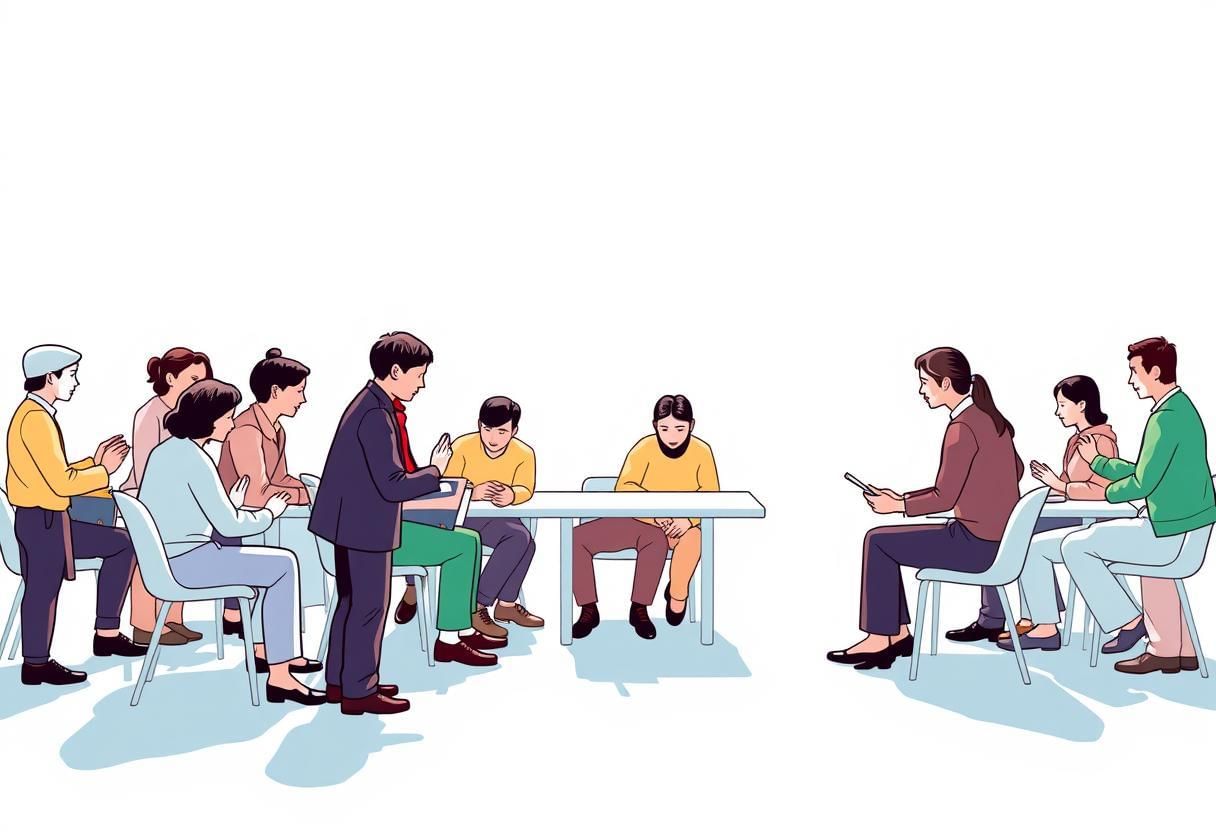 Social Safety Net
Social Safety Net
The idea of the welfare state in England was first introduced by Herbert Henry Asquith during his time as Prime Minister from 1908 to 1916. Asquith, a member of the Liberal Party, believed in protecting workers from sickness and unemployment. This was reflected in the National Insurance Act of 1911, which aimed to safeguard workers' rights.
The Beveridge Report
The welfare state concept was later expanded in the Beveridge Report of 1942, created by William Henry Beveridge, a British civil servant and reformer. The report proposed several key ideas, including:
- A free national health service
- Family allowances
- Government efforts to ensure full employment
- Universal social insurance "from the cradle to the grave"
- Benefits for unemployment, sickness, and accidents
- Pensions for old age and widows
- Funeral grants and maternity benefits
Most of the recommendations from the Beveridge Report were accepted and implemented, transforming England into a model welfare state.
What is a Welfare State?
A welfare state is a government system that provides various social services to its citizens, ensuring their well-being and security. These services include:
- Social security: Financial support for individuals facing job loss, death of a breadwinner, long-term illness, disability, or other crises.
- Free education: Access to education for all citizens without any cost.
- Public health services: Healthcare services provided by the government to ensure the health and well-being of the population.
- Support for the poor: Assistance and resources for individuals and families in financial need.
- Provision of essential goods and services: Providing items like food, milk, fuel, and transport at subsidized rates to ensure basic needs are met.
To fund these services, the government uses progressive taxation, where individuals with higher income and wealth pay more taxes. This helps redistribute wealth and support those who are struggling in a competitive market.
Before the welfare state was established, social services in England were provided through a system of poor relief, which often stigmatized the poor and required them to sacrifice their self-respect to receive assistance. The welfare state replaced this system with one of mutual assistance and self-reliance, ensuring that all citizens have the means for a dignified life, including:
- Minimum basic needs
- Housing
- Employment
- Adequate living standards
- Opportunities for personal growth
Over time, the concept of the welfare state gained traction in countries like France, Italy, West Germany, Sweden, Australia, and New Zealand. However, it was not warmly embraced in the United States, which preferred to uphold the principles of an open and competitive system. For developing nations, adopting the welfare state model became almost essential due to the urgent need to address widespread poverty and the historical tradition of social support for the less fortunate. As urbanization increased, the traditional means of providing social support were diminished, necessitating a greater role for the state in welfare. Nevertheless, these countries could only establish welfare states on a limited scale due to severe resource constraints, sometimes relying on foreign assistance. The effectiveness of welfare states in these nations was often hampered by issues of bureaucratic inefficiency and corruption.
Socialist Model
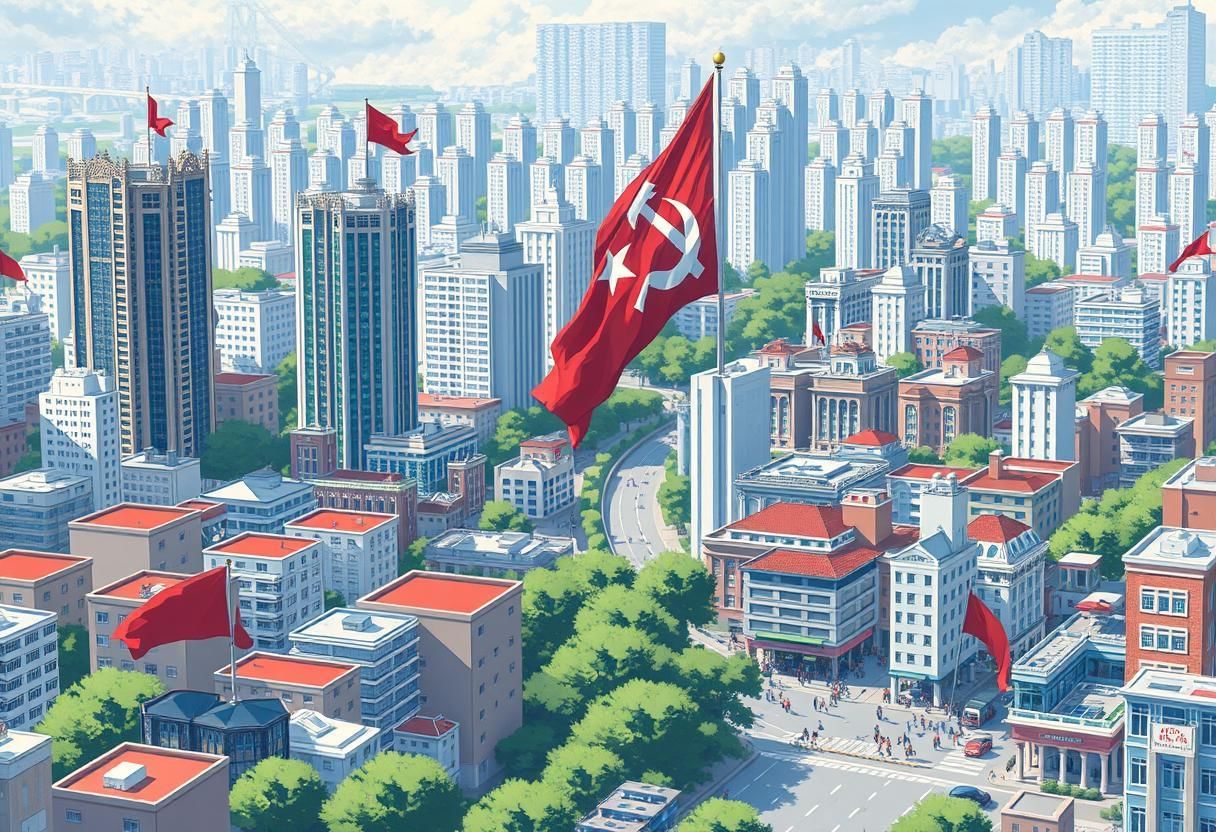 Socialist Urban Struggle
Socialist Urban Struggle
The socialist model of development can be inspired by two main streams: revolutionary socialism and evolutionary socialism.
Revolutionary Socialism
Revolutionary socialism is rooted in the ideas of Karl Marx, Friedrich Engels, and V.I. Lenin. It emphasizes:
- Class struggle between dominant and dependent classes.
- Revolutionary methods to overthrow capitalism.
- Socialization of major means of production like land, mines, and machinery.
This system was first implemented in the former Soviet Union in 1917 after the Bolshevik Revolution. Other countries adopted it either independently or under Soviet guidance and remained part of the Soviet bloc until its dissolution in 1991. Countries like Hungary, Poland, East Germany, Czechoslovakia, Bulgaria, and Romania were never considered part of the third world. While many of these countries moved away from socialism, some retained elements of socialist policies or mixed economies. Albania, which left the Soviet bloc in 1968 and became part of the third world, has since abandoned socialism. Yugoslavia, Mongolia, and Southern Yemen, which adopted socialism independently and remained part of the third world, have also abandoned this system. The People’s Republic of China, Vietnam, North Korea, and Cuba, which adopted socialism independently and remained part of the third world, continue to uphold this system, although not strictly.
Revolutionary Socialist Systems
 Social Justice
Social Justice
Revolutionary socialist systems are recognized for their commitment to safeguarding the interests of workers and ensuring fundamental social and economic rights. They strive to provide nearly universal access to employment, education, and health care for their citizens. However, a significant drawback of these systems is their tendency to overlook and compromise on the civil liberties and political rights of individuals.
Evolutionary Socialism
Evolutionary socialism, also known as democratic socialism, seeks to establish socialism through democratic means. This approach places a strong emphasis on:
- Upholding civil liberties and political rights for all citizens.
- Gradually expanding social and economic rights.
- Strengthening the social safety network to support vulnerable populations.
At its core, evolutionary socialism is grounded in principles of social justice and the welfare of citizens, which garner broad public support in democratic elections. This model is akin to the welfare state framework, with England serving as a prominent example since the 1940s.
Current Trends
Countries like India and other developing nations aspire to adopt the democratic socialist model. However, its appeal has waned in recent times due to challenges such as:
- A large and growing population.
- Persistent resource shortages.
- Bureaucratic inefficiencies.
- Widespread corruption.
These factors complicate the management of increasing demands for subsidies and reservations for the poor and underprivileged, who outnumber those in the general category. As a result, there is a noticeable shift towards liberalisation, privatisation, and globalisation, a trend currently underway in India.
It is crucial for policy-makers to remain mindful of the country's intellectual traditions, cultural heritage, and...
The Gandhian Model
 Natural Ethics
Natural Ethics
Mahatma Gandhi, the father of the Indian nation and a moral philosopher, did not propose a specific theory of development. However, his ideas offer valuable insights for guiding humanity. Gandhi believed in prioritising morality over politics, viewing politics as a means to achieve moral goals. His role in India’s independence movement aimed at ensuring the moral regeneration of the country.
Gandhi opposed the idea of India imitating Western civilisation, as he believed that certain aspects of Western culture promote consumerism, leading to moral decline. He argued that true moral strength comes from self-control and a spirit of renunciation, rather than fulfilling material needs. In his writings, Gandhi expressed his opposition to the modern notion of increasing material wants and satisfying them, emphasising that true improvement in a person’s life lies in their conscience and commitment to fulfilling their duties.
Gandhi believed that people should only consume the minimum amount of material goods necessary for physical well-being. Taking more than this is akin to depriving others of what rightfully belongs to them. He envisioned that the Earth has sufficient resources to meet everyone’s needs but not their greed.
Gandhi cautioned that a greedy individual can inflict significant harm on nature and society. Those who fail to rein in their desires create a scarcity of resources for others. Therefore, self-restraint is beneficial not only for oneself, as it fosters a strong moral character, but also for others. Gandhi's concept of 'bread labour' advocates that everyone should engage in physical work to produce goods for their own use, alongside their regular responsibilities. This practice will help meet the needs of a large population and elevate the dignity of labour.
Alternative Paths of Development
 Conscious Simplicity
Conscious Simplicity
The Issue
- Market Society Model
- Welfare State Model
- Socialist Model
Status of the Individual
- Autonomous
- Autonomous but Responsible to Social Needs
- Fully Responsible to Social Needs
Entitlements of the Individual
- Opportunity to use full potential in self-interest
- Freedom and social security in case of undeserved want
- Employment, education, health care, and social security
- Fulfilment of genuine, basic needs
Status of Rights
- Full provision of civil liberties and political rights
- Democratic Rights and Social and Economic Rights as far as feasible
Priority to Social and Economic Rights
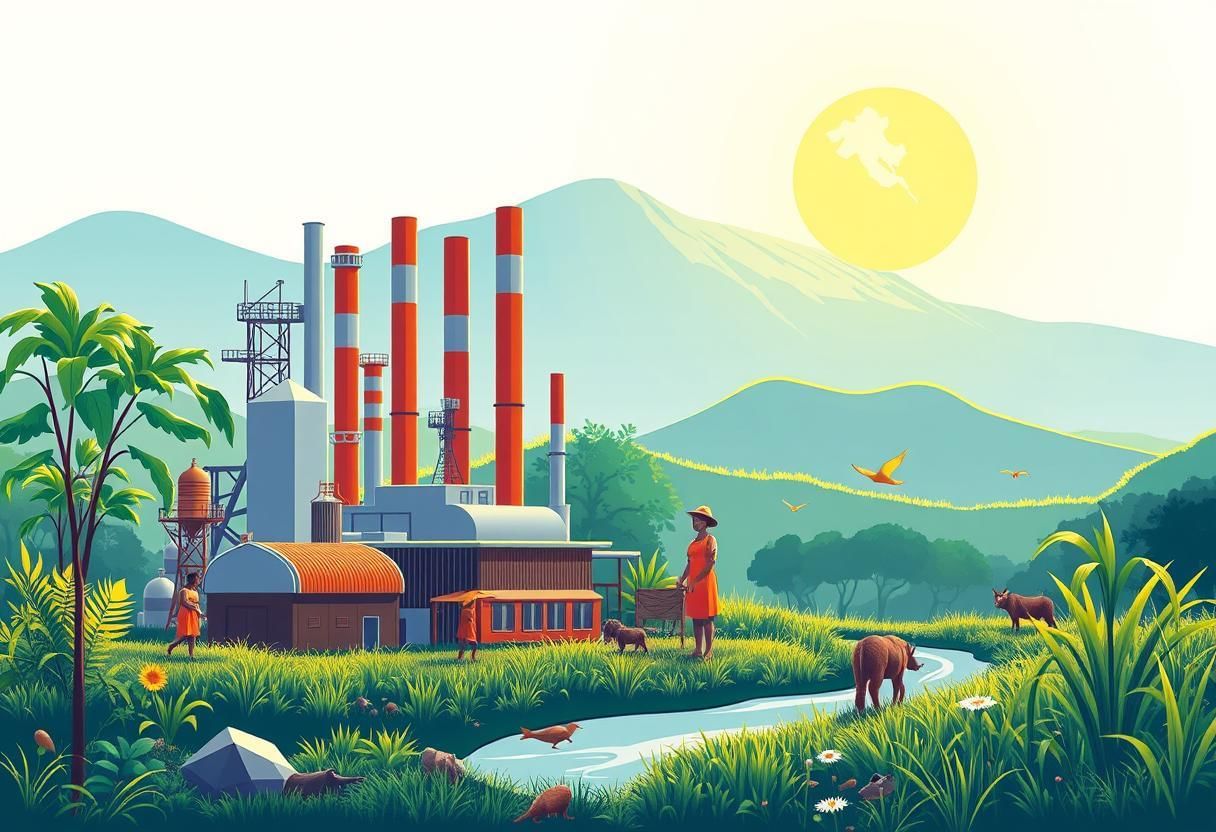 Sustainable Progress
Sustainable Progress
- Duty is prior to rights
Attitude toward Industrialization
- Necessary for Development
- It should be limited to using current manpower to meet basic needs
Attitude toward Nature
- Indifferent
- Very friendly
Goal of Development
- Everyone should receive a suitable reward based on merit
- Reward of merit aligned with social responsibility
- Respectable living and pleasant conditions to serve
- Build high moral character of individuals, valuing dignity of labour
Production by the Masses vs. Mass Production
- Gandhi advocated for "production by the masses" in India, emphasizing the importance of rural employment and the need to reduce reliance on industrialization.
- He believed that machinery should assist and ease human effort, rather than compete with the millions of individuals in India's villages.
- Gandhi argued that the current use of machinery tended to concentrate wealth in the hands of a few, disregarding the livelihoods of the many.
Non-violence and Nature
- Gandhi's principle of non-violence extended beyond human interactions to include our relationship with nature.
- He condemned actions that harm the earth, degrade nature through over-exploitation of resources, and create inequality among people.
- His vision was to promote a harmonious relationship with nature, ensuring environmental sustainability and social equity.
The Role of Non-Violence in Our Relationship with Nature
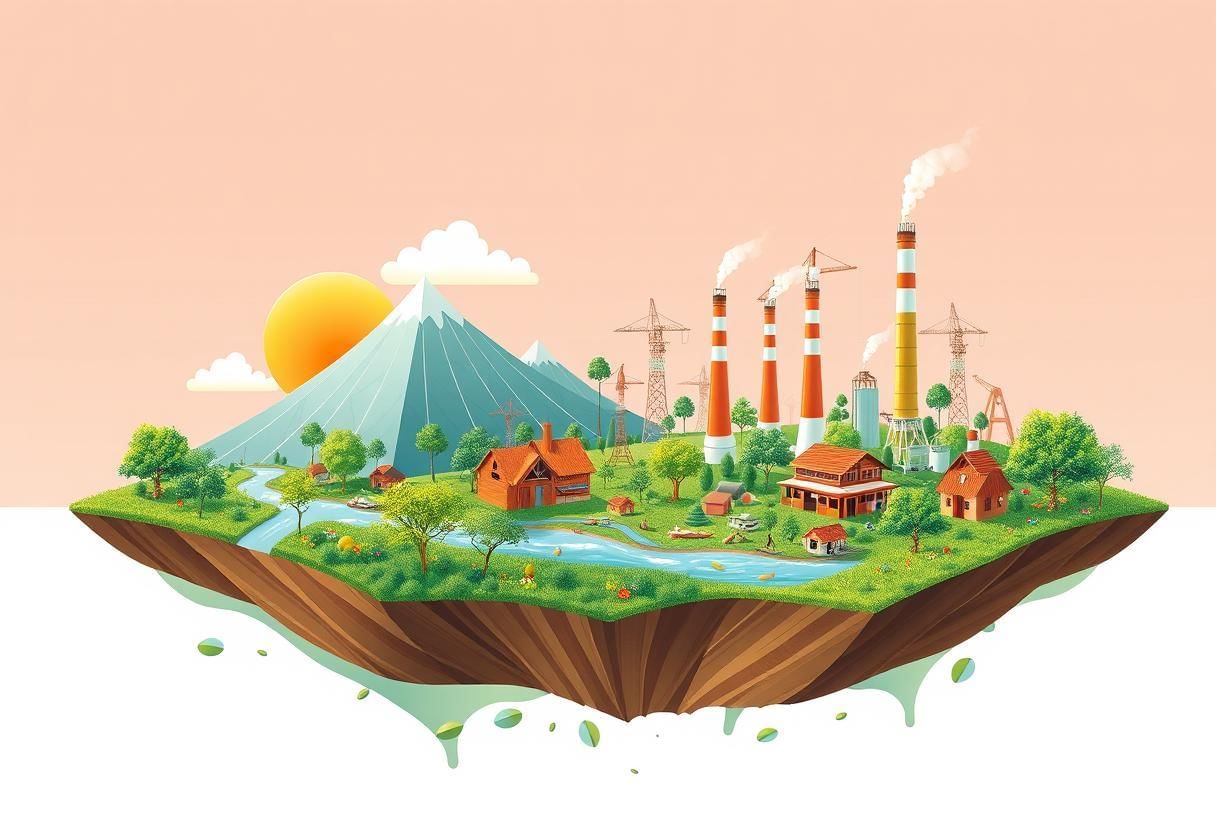 Eco-friendly progress
Eco-friendly progress
Non-violence towards nature is crucial, but it needs to be at the core of human culture for it to be effective.
Sustainable Development and the Gandhian Approach
- Gandhi's Vision : Gandhi believed in stopping industrialization to protect nature. Today, while we can't stop it, his ideas are being recognized by those who support sustainable development.
- Sustainable Development : This concept focuses on limiting consumption, especially by the wealthy, to avoid over-exploiting nature and to save resources for future generations.
The Role of Machinery
- Machinery : While machines have their advantages and are a permanent part of our lives, they should not replace essential human labor.
Understanding Sustainable Development
Development : Development can bring improvements, but it also comes with significant challenges. The goal is to enhance human life in all aspects. However, there are negative impacts in the economic sphere:
- Resource Exploitation : Economic development requires more production, which often leads to the exploitation of natural resources.
- Energy-Intensive Machines : Today, large machines powered by substantial energy are used to meet the growing demand for consumption, accelerating the exploitation of natural resources.
Given this situation, we need to ask ourselves:
- Can this process go on forever?
- Do we have an unlimited supply of natural resources?
- Is our reckless exploitation and consumption harming the environment?
- If yes, what can we do to prevent a future disaster?
These questions are central to the idea of sustainable development.
Sustainable Development
 Eco Harmony
Eco Harmony
The concept of sustainable development was clearly articulated in the Brundtland Report, titled Our Common Future, published in 1987. This report recognized the finite nature of natural resources and stressed that development should fulfill the needs of the present generation without compromising the ability of future generations to meet their own needs. The idea was first introduced at the United Nations Conference on the Human Environment in Stockholm in 1972, which raised concerns about the rapid depletion of limited natural resources. The Brundtland Report built on these concerns and aimed to redirect development towards a more sustainable path.
By emphasizing the "needs" of both present and future generations, the Brundtland Report highlighted the urgent need to eradicate poverty and address the basic needs of a large portion of the global population. Sustainable development seeks to find ways to promote economic and social growth without causing environmental harm, overexploitation, or pollution. This emphasis on development was particularly welcomed by developing countries and organizations focused on combating poverty and social inequality. The discourse around sustainable development continues to be a significant topic among environmental advocates.
Development and Environmentalism
Environmentalism, also known as ecologism, naturally follows from the principle of sustainable development. It seeks to redefine the relationship between humans and nature, as well as the relationships among humans themselves. This perspective argues that people should no longer see themselves as the "masters" of nature but rather as partners with other living beings. It also calls for a fundamental reorganization of human societies.
Introduction
 Sustainable Harmony
Sustainable Harmony
Environmentalism is a social and political movement that seeks to protect and improve the health of the planet and its ecosystems. It emerged in response to the increasing awareness of environmental degradation, pollution, and the unsustainable exploitation of natural resources caused by human activities. The movement advocates for sustainable practices, conservation of natural resources, and policies aimed at reducing environmental harm.
The history of environmentalism is closely tied to the development of human civilization and the changing relationship between people and nature. In the early stages of civilization, when the human population was small and resources were abundant, people lived in harmony with nature, using only what they needed and causing little harm to the environment. However, as the population grew and technology advanced, the demand for resources increased, leading to overexploitation and pollution.
Environmentalism is a response to the imbalance created by industrialization and urbanization, aiming to restore the connection between humans and nature and ensure a sustainable future for the planet.
At the beginning of human civilization
At the start of human civilization, the population was quite small. People lived a straightforward life and were very connected to nature. Their needs were minimal, so a small amount of production was enough to meet them. The resources they took from nature, such as oxygen, nitrogen, and carbon, were naturally replenished. This meant that normal human consumption did not harm nature. The abundance of natural resources and their low consumption made it hard to foresee any future shortages.
Population Growth and Resource Exploitation
However, over time, the human population increased, and consumption levels rose as technology advanced to meet these growing demands. This resulted in a significant exploitation of natural resources, leading to concerns about depletion. Additionally, the rise in the use of artificial products distanced people from nature. As consumption patterns changed, they began to pollute the environment. Consequently, new efforts were needed to restore balance between humans and nature. The political response to this was the emergence of environmentalism.
Early Thoughts on Environmentalism
Early signs of environmentalism can be found in E.F. Schumacher's influential book Small is Beautiful (1973). In this work, he critiqued modern industrial society, noting that it, despite its intellectual advancements, was consuming the very resources it depended on. Schumacher cautioned against confusing the earth's non-renewable resources with 'capital,' which can be created, spent, or invested. Non-renewable resources cannot be replaced. By using these resources, modern industrial society is essentially depleting its own capital and jeopardising its future.
Environmental Responsibility in Advanced Societies
 Sustainable Future
Sustainable Future
Advanced industrial societies, characterized by higher levels of production and consumption, bear a greater responsibility for environmental degradation and pollution compared to developing societies. Ted Trainer, in his work "Abandon Affluence!" (1985), highlights the stark contrast in energy usage, noting that each American consumes 617 times more energy per year than the average Ethiopian. This excessive consumption by Americans is further supported by data indicating that:
- Americans make up 6% of the global population.
- They are accountable for approximately 50% of manufactured goods consumption.
- They represent 33% of the world’s energy consumption.
Such disproportionate consumption leaves minimal resources for poorer countries with large populations, contributing to their impoverishment and adversely affecting the health of Americans themselves.
Environmental Advocates' Recommendations
Environmentalists advocate for individuals in advanced nations to adopt more sustainable practices, including:
- Reducing the use of private vehicles.
- Increasing reliance on public transportation and bicycles.
- Shifting dietary habits from fish and mutton to green vegetables and pulses.
- Promoting the use of wind and solar energy over coal, electricity, and nuclear energy.
- Encouraging global tree planting initiatives.
The environmental movement has inspired many Americans to embrace activities such as:
- Running
- Cycling
- Eating natural foods
- Relocating to rural areas
A similar shift is observable in other countries as well. Environmentalists advocate for a harmonious relationship between humans and nature, emphasizing the importance of preserving natural greenery. This perspective is often referred to as the "Green movement" or "Green politics."
Environmental Degradation and the Need for Humility
 Climate Crisis
Climate Crisis
Environmentalists argue that the current practice of extracting natural resources to fuel a growing manufacturing sector has physically and spiritually disconnected humans from nature. To restore this balance, we must approach our environment and the diverse species on Earth with a sense of humility. The relentless pursuit of natural minerals and resources to feed an increasingly greedy manufacturing system is causing severe environmental degradation and harming humanity. This extraction process releases various pollutants into the atmosphere, adversely affecting the health of all living beings, including plants and animals. Moreover, it contributes to the greenhouse effect, global warming, and ozone depletion, which threaten the very existence of mankind.
Greenhouse Effect
The greenhouse effect is a natural phenomenon that has been exacerbated by human activities, leading to global warming. This process involves:
- The increase in Earth’s temperature due to the buildup of carbon dioxide and water vapor in warm air trapped by cold air.
- The absorption of heat from infrared rays by the Earth’s atmosphere, causing a rise in surface temperatures.
- The melting of polar ice as a result of rising temperatures.
Global Warming
Global warming refers to a significant increase in Earth’s temperature due to rising pollution levels in the atmosphere. This pollution is primarily caused by:
- Increased consumption of petrol and diesel fuels.
- Soil erosion resulting from deforestation and the destruction of mountains.
The consequences of global warming are alarming and include:
- Climate change
- Melting of polar ice
- Rise in sea levels
Ozone Depletion
 Protecting Atmosphere
Protecting Atmosphere
Ozone is a special type of oxygen made up of three oxygen atoms, while regular oxygen has two. The ozone layer, situated between 10 and 50 kilometers above the Earth's surface, plays a crucial role in protecting our planet. It absorbs most of the sun's harmful ultraviolet (UV) radiation, safeguarding plants and animals from its harmful effects. However, there are growing concerns that increasing atmospheric pollution is causing the ozone layer to thin, particularly creating a hole over Antarctica.
Environmentalists' Vision
Environmentalists advocate for a fundamental change in the current large-scale industrial system to safeguard the environment. They propose replacing it with a smaller-scale manufacturing system supported by self-sufficient local communities. In simpler terms, they believe that massive production systems should be scaled down to sizes that are more human-friendly.
- Environmentalists envision an ideal world consisting of small communities with moderate levels of consumption.
- This concept is encapsulated in Schumacher's famous saying, "Small is beautiful."
Population Control
To lower overall consumption levels, environmentalists advocate for population control. While large populations in developing countries contribute to various social and economic challenges, it's important to recognize that their consumption levels are relatively low. With proper planning, their significant physical labor potential can be harnessed effectively.
- People in Western countries, who enjoy a high standard of living and high consumption rates, also need to practice reasonable population control and limit their consumption.
Environmental Responsibility
 Sustainable Together
Sustainable Together
Environmentalists advocate for the moral regeneration of humanity to ensure a fair and just distribution of resources. By recognizing our responsibility to maintain a clean and harmonious atmosphere, individuals worldwide can create a better living environment for both present and future generations. This concept is beautifully captured in a U.N. slogan: "We have not inherited this earth from our forefathers; we have borrowed it from our children."
Local Action for Global Impact
- The idea of individual responsibility is further emphasized by the environmentalist slogan: "Think globally, act locally."
- When people come together in small communities, they are encouraged to take action at the local level.
- By being aware of how their actions impact the global environment, individuals naturally begin to think on a global scale.
Collaboration for a Better Future
- A slogan from British and German environmentalists calls for people to set aside their ideological differences and work together for a better future for all.
- The slogan encourages this unity: "Neither left nor right, but forwards."
Understanding Political Development
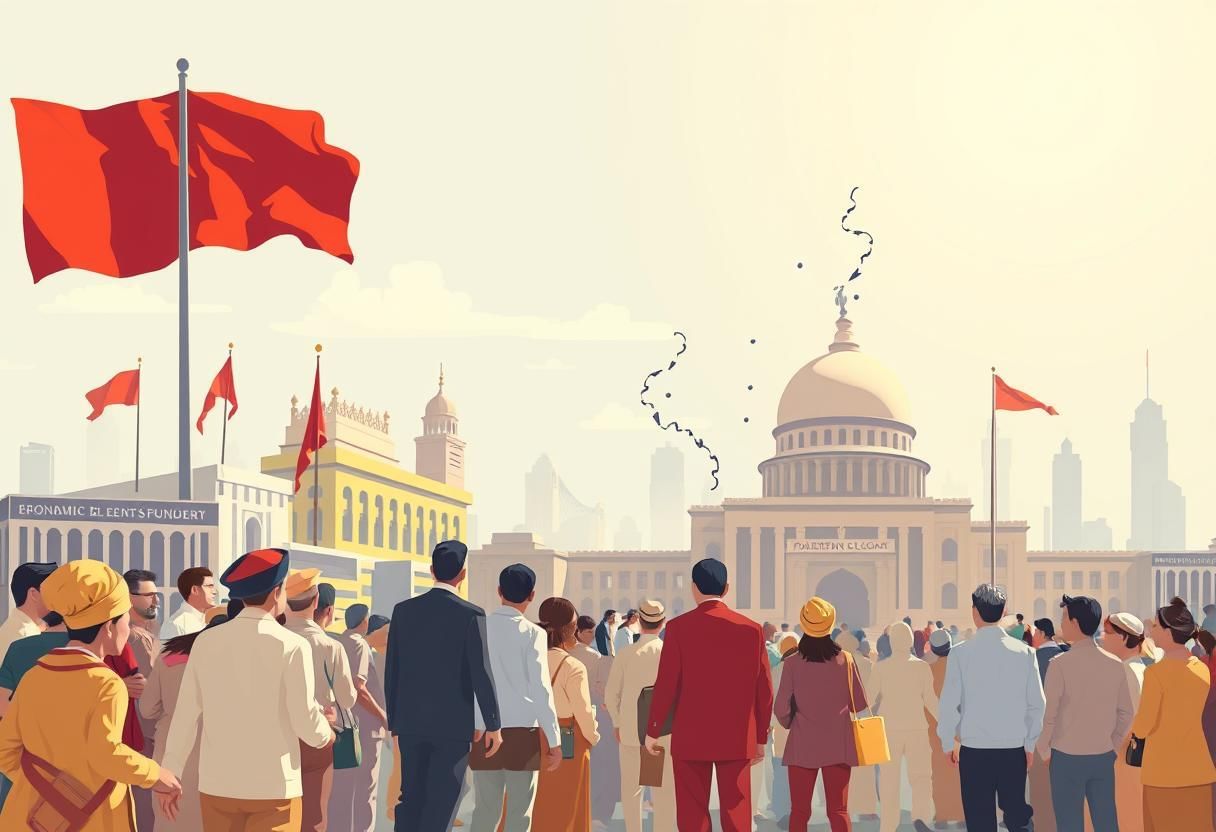 Societal Evolution
Societal Evolution
Political development is a concept that emphasizes the need for developing countries to transform their political systems and institutions to resemble those of developed nations. This transformation is considered essential for achieving comprehensive development.
Key Aspects of Political Development
- Prioritization of Development: Developing countries focus on their progress as a central aspect of public policy.
- Transformation of Political Environment: Many scholars argue that achieving development requires changing the political environment and institutions to align with modern standards.
- Adoption of Developed Country Features: Political development involves adopting characteristics typical of developed countries within the political system of a developing nation.
Origins of Political Development
- The concept originates from the liberal tradition in the West, where Western liberal democracy is viewed as a key model for developed societies.
- Development is often referred to as 'modernization,' while political development is called 'political modernization.'
Modernization vs Traditional Values
- Modernization involves the shift from traditional values and institutions to contemporary lifestyles, which are considered more suitable for industrial and technology-based societies.
- Traditional values are seen as appropriate for agrarian economies, while modern systems are believed to better meet the needs and aspirations of individuals in today's world.
Various Models of Political Development
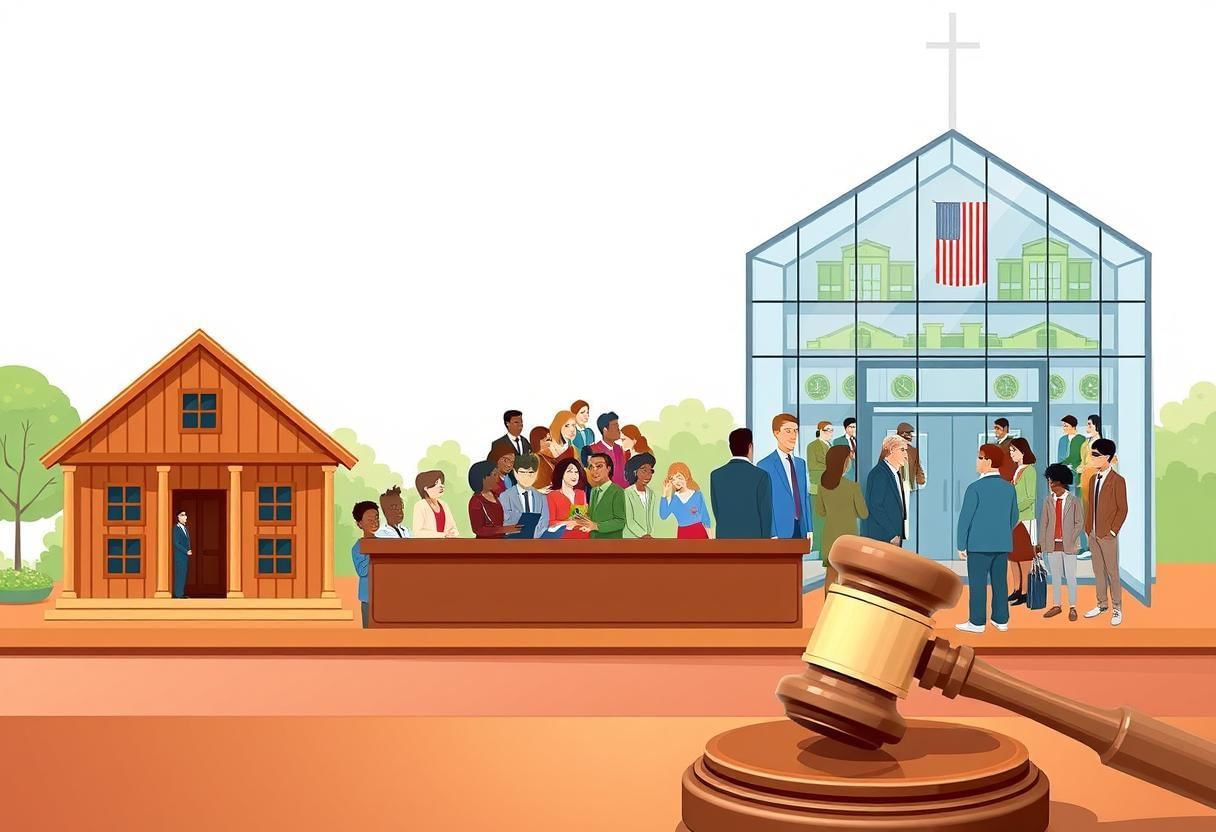 Modern Governance
Modern Governance
Different writers have suggested different models of political development. Among these, two models proposed by James S. Coleman and Lucian Pye in their book Political Culture and Political Development (1965) stand out and share similar ideas.
Coleman and Pye's model views political development as political modernization. They argue that a modern political system is as superior to a traditional political system as a modern industrial system is to traditional, non-mechanized agriculture.
Traditional political systems, while differing in focus, were primarily concerned with:
- Collecting taxes
- Maintaining law and order
- Ensuring defense
In contrast, a modern political system not only performs these traditional roles but also actively strives to enhance the quality of life for its citizens.
People's Involvement in Politics
In traditional political systems, public involvement in politics was minimal, with the government making decisions with little input from the populace. However, in a modern political system:
- Citizens are more actively engaged in political processes.
- They communicate their needs and opinions to the government.
- They express their support or opposition to government policies and decisions.
The government depends on the legitimacy of its actions to secure public support and cooperation. This model highlights three essential features of political modernization:
- Differentiation
- Equality
- Capacity
Together, these elements constitute what is known as the "development syndrome."
Differentiation in Political Systems
Differentiation refers to the gradual process of separating and specializing roles, institutions, and associations within the political system. Examples of differentiation include:
- The separation of occupational roles from kinship ties
- The separation of legal norms from religious practices
- The separation of administrative functions from political decision-making
Equality in Contemporary Society
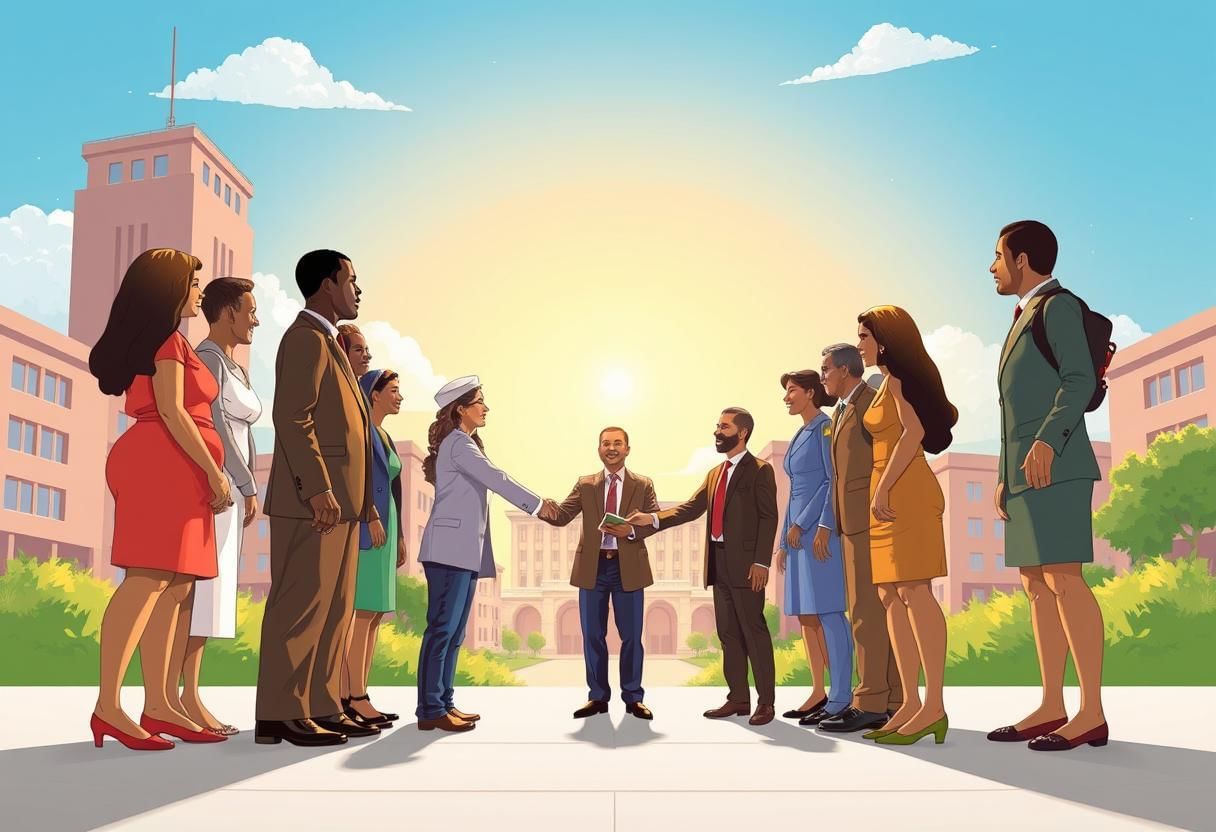 Equitable Governance
Equitable Governance
Equality is regarded as the fundamental principle of contemporary society. It encompasses:
- The concept of universal adult citizenship.
- Legal equality for all citizens.
- Equitable opportunities for everyone to succeed based on their talents and efforts.
In this transformation, the 'subjects' of traditional society evolve into 'citizens' of modern society. The contemporary political system encourages public participation in governance, fostering greater respect for the law.
Capacity of the Political System
In this context, capacity refers to the political system's improved ability to:
- Manage public affairs effectively.
- Resolve conflicts efficiently.
- Address the emerging demands of citizens.
Political Development Model
The second model of political development was put forward by Gabriel Almond and G.B. Powell in their work Comparative Politics: A Developmental Approach in 1966. This model, grounded in structural-functional analysis, highlights three essential aspects of political development:
- Structural differentiation
- Secularisation of culture
- Expansion of capabilities
Structural Differentiation
Structural differentiation refers to the establishment of distinct structures or institutions within the political system, each designed for specific functions. This differentiation operates on two levels:
- Input level: At this level, the focus is on creating appropriate non-governmental structures for various functions, including:
- Political socialization, facilitated by entities such as families, schools, and peer groups.
- Interest articulation, carried out by interest groups.
- Interest aggregation, primarily undertaken by political parties.
- Political communication, managed by mass media.
- Output level: This level emphasizes the 'separation of powers' among different branches of government, each responsible for specific functions:
- Rule-making, handled by the legislature.
- Rule-application, carried out by the executive.
- Rule-adjudication, managed by the judiciary.
Secularization of Culture
 Civic Awareness
Civic Awareness
The secularization of culture involves a shift towards a more rational, empirical, and analytical approach in political thinking and actions. This process signifies an evolution from lower to higher levels of political culture, specifically transitioning through three stages:
- Parochial culture: In this initial stage, individuals have a limited awareness of the political system beyond their local community. Their understanding and engagement are confined to local issues, and they do not recognize the broader political context.
- Subject culture: At this stage, individuals acknowledge the existence of a larger political system but accept its decisions without questioning or challenging them. They recognize the authority of the political system but do not actively engage with it.
- Participant culture: This is the highest level of political culture, where individuals actively engage in the political system. They not only recognize and accept the system but also participate in it, influencing decisions and policies.
Expansion of Capabilities
The expansion of capabilities within a political system involves enhancing four key types of abilities:
- Regulative capability: This refers to the lawful power to control the behaviour of individuals and groups within society. It involves establishing and enforcing rules and regulations to maintain order and discipline.
- Extractive capability: This is the ability to gather natural and human resources from society and abroad. It involves mobilising and utilising resources necessary for the functioning and development of the political system.
- Distributive capability: This capability involves sharing various benefits among individuals and groups within society. It includes the equitable distribution of resources, services, and opportunities to ensure social justice and cohesion.
- Responsive capability: This refers to the ability to address demands and needs from society and the international community. It involves being attentive and responsive to the concerns and expectations of different stakeholders.
For balanced development, it is crucial that regulative and extractive capabilities align well with distributive and responsive capabilities. This ensures a harmonious and effective functioning of the political system, where control and resource gathering are complemented by fair distribution and responsiveness to needs.
Cultural Aspects of Political Institutions
The cultural elements of a community, including its values, norms, and beliefs, play a crucial role in providing legitimacy to its political institutions and ruling classes. These cultural aspects also influence how individuals relate to and engage with these institutions and authorities. According to Gabriel Almond and Sidney Verba in their 1965 work 'The Civic Culture', there are three distinct types of political culture:
- Parochial culture: In this type of culture, individuals have a limited understanding of the broader political system. Their awareness and engagement are confined to local issues, and they do not recognize or participate in the larger political context.
- Subject culture: Individuals in subject culture recognize the existence of the political system but accept its decisions passively. They do not actively engage with or challenge the system, accepting its authority without question.
- Participant culture: This type of culture is characterized by active participation in the political system. Individuals respect authority but also feel independent and believe they can influence the system. They engage in political processes and contribute to decision-making, shaping the political landscape.
There are certain traits that can help developing societies to function better and effectively if they are cultivated in their political systems. These countries, due to their large size, complex multicultural nature, and a tradition of community spirit, should not be simplified to just competitive market societies for the sake of political progress.
Characteristics of Political Development: Comparative Study
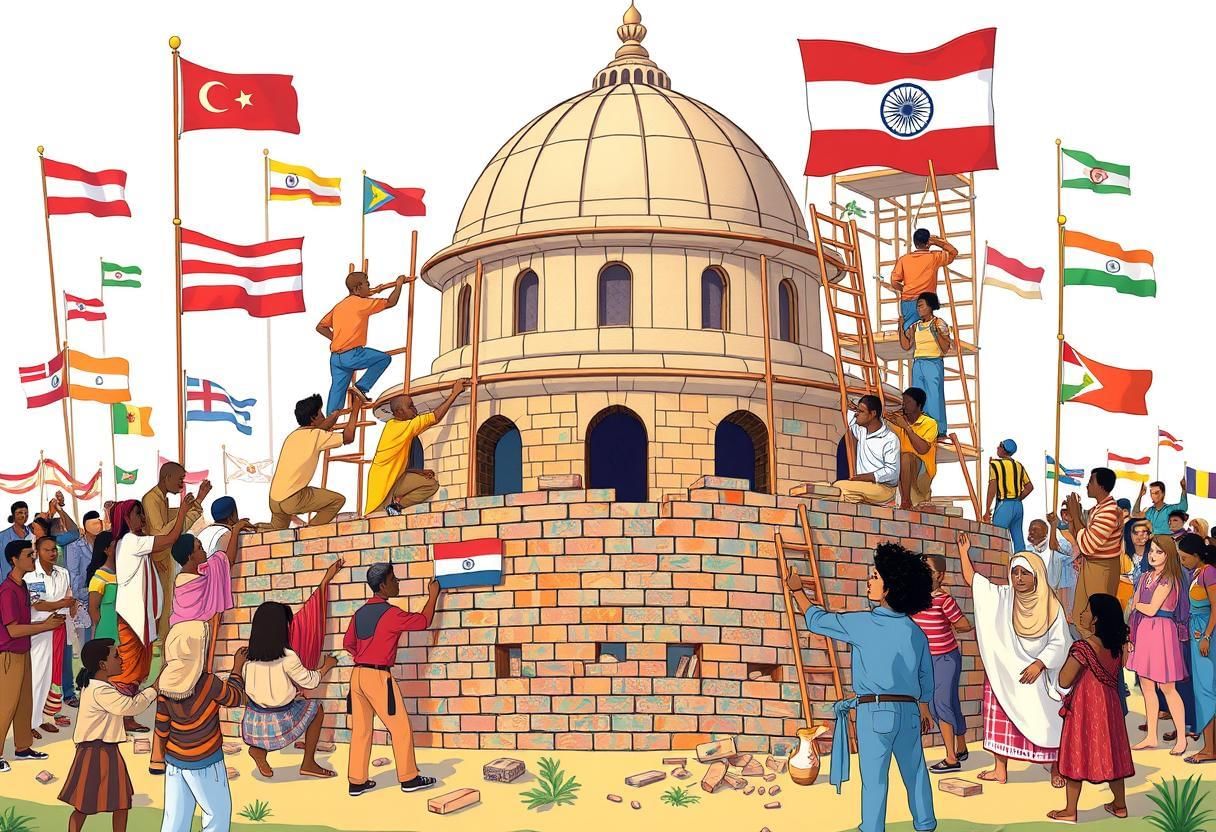 Multicultural Nationhood
Multicultural Nationhood
Political Modernization model by James Coleman and Lucian Pye
Political Development model by Gabriel Almond
Structural Differentiation
- Refers to the gradual separation and specialization of roles, institutional areas, and associations within the political system.
- Involves the creation of specific structures for specific functions at both input and output levels.
Secularization of Culture
- Involves universal citizenship, legal equality, and equality of opportunity.
- Adopting a more rational, empirical, and analytical perspective leading to political participation as equal citizens.
Improving Efficiency
- Focuses on improving efficiency to better address the needs and aspirations of the population.
- Balancing the regulatory and extractive functions of the political system with its distributive and responsive functions.
Nation-Building and State-Building
- The concepts of nation-building and state-building are closely linked to political development.
- These processes are particularly significant for new nations in Asia, Africa, and Latin America, often referred to as 'developing' nations.
- However, the term 'developing' may require further clarification regarding its defining criteria.
Political Integration, Nation-Building, and State-Building
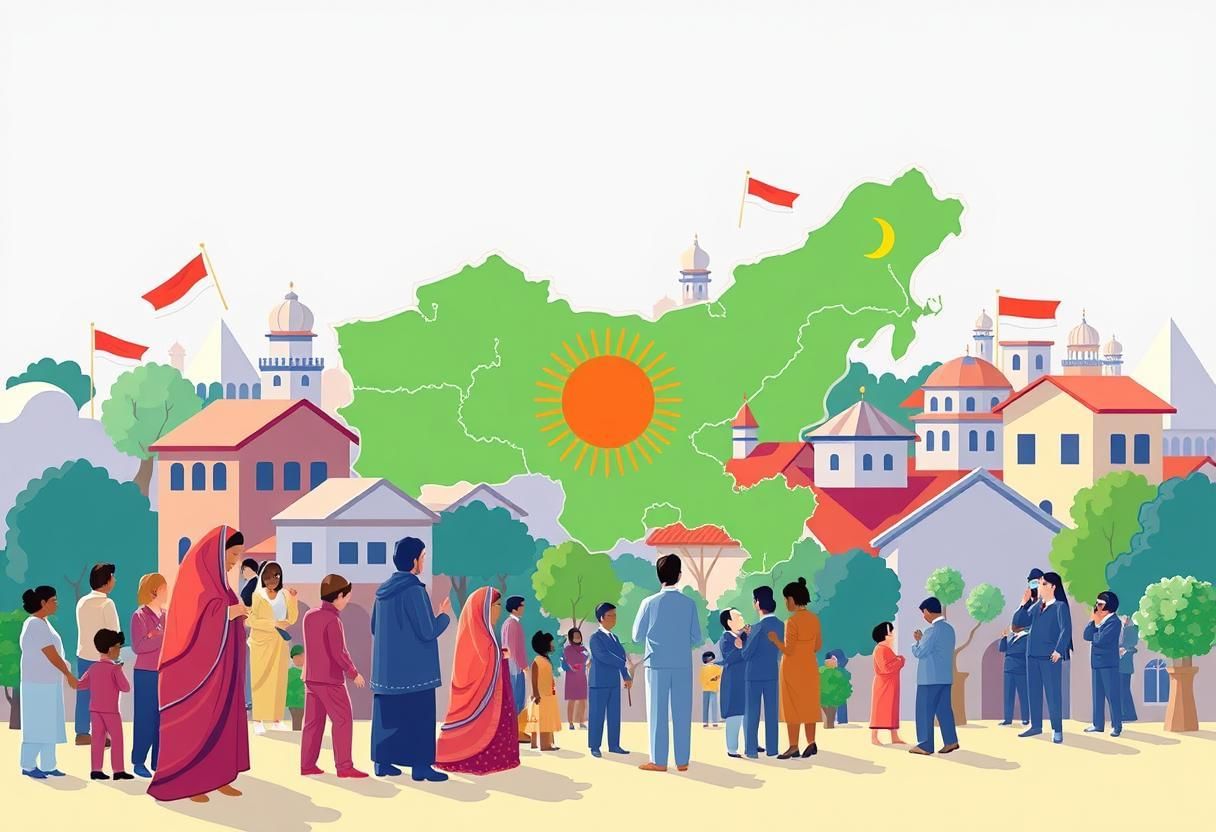 Unity in Diversity
Unity in Diversity
The processes of political integration, nation-building, and state-building are interconnected and should be pursued together as they mutually reinforce each other.
Political Integration
- New nations often struggle with political integration, which involves uniting diverse groups into a single national identity.
- These countries typically contain a mix of different racial, tribal, ethnic, religious, and regional communities, each with a weak sense of collective identity.
- To create a cohesive nation-state, it is essential to address the challenges of both nation-building and state-building.
Nation-Building
- Nation-building is the process of shifting people's loyalty from smaller groups, such as tribes or villages, to a larger political entity.
- This process fosters a sense of community, creating emotional bonds and social solidarity among the people within a political system.
- By promoting a common identity, nation-building encourages individuals to identify with the nation as a whole, rather than just their local groups.
- Nation-building also involves integrating various sectors of society, building consensus, and fostering cooperation, which are crucial for maintaining domestic peace and political stability.
- Additionally, it establishes the legitimacy of the nation as the central authority in the political system.
State-Building
- State-building is a critical component that complements nation-building.
- It involves creating a central authority capable of maintaining law and order, as well as providing essential services such as defense and welfare to all regions of the state.
- Respect for authority and trust in the state can only be achieved when the government meets the needs and aspirations of its citizens.
Rajni Kothari's Insights on State-Building and Modernisation
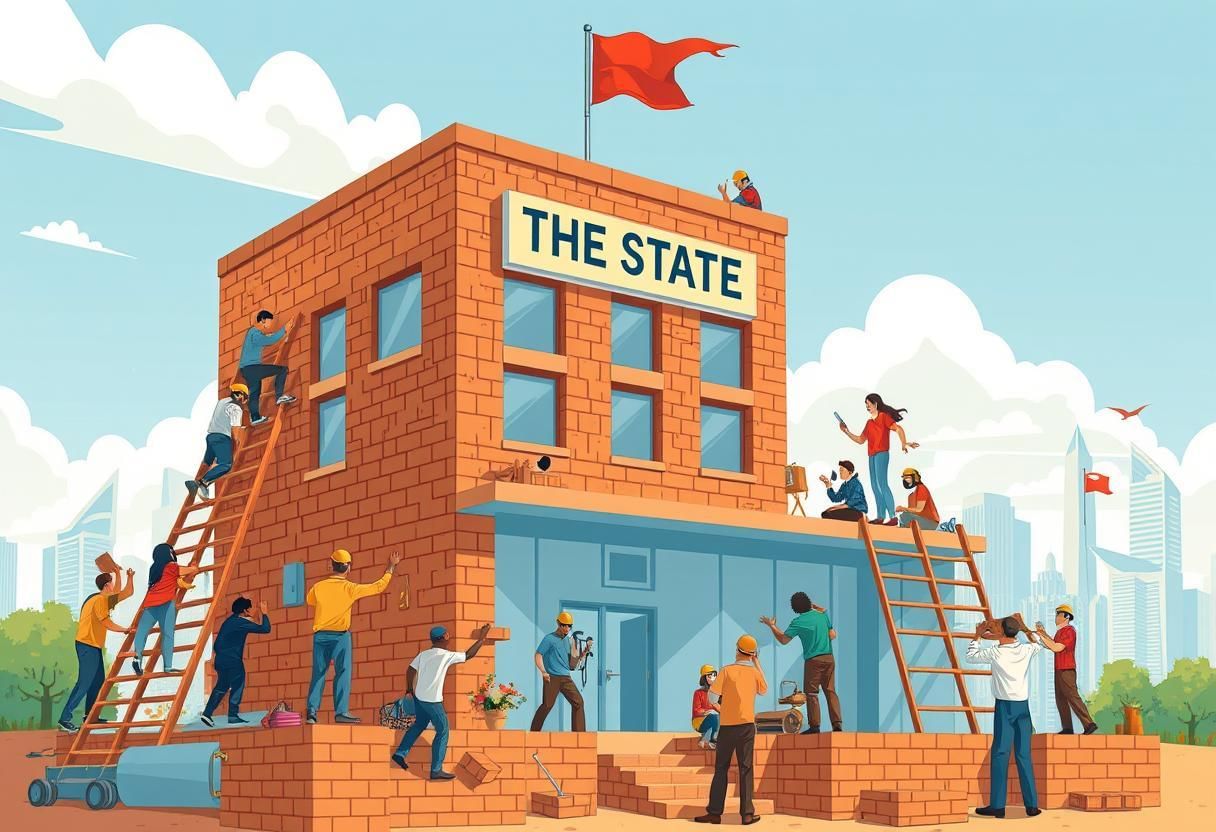 Nation Building
Nation Building
Rajni Kothari, a prominent Indian scholar, has observed that state-building and nation-building are crucial for a country's political progress. On the other hand, modernisation pertains to the economic, technological, and administrative aspects of a nation.
Modernisation vs. Political Development
- Some Western political scientists argue that developing countries should prioritize modernisation first.
- They believe that political development will follow naturally if these countries focus on:
- Increasing their Gross National Product (GNP)
- Promoting urbanisation
- Establishing an efficient bureaucracy
- Adopting appropriate technology
- Encouraging social mobilisation
However, Kothari argues that this view is not supported by European history. In Europe, national consolidation occurred before modernisation. Therefore, he suggests that developing countries should prioritise state-building and nation-building before focusing on modernisation.
|
112 videos|389 docs
|
FAQs on O P Gauba Summary: Concept of Development - Sociology Optional for UPSC (Notes)
| 1. What is the definition of development in the context of economics and social sciences? |  |
| 2. What are the main differences between underdevelopment and development? |  |
| 3. What are some alternative paths of development that countries can pursue? |  |
| 4. How does sustainable development relate to environmentalism? |  |
| 5. What is political development, and how does it influence overall development? |  |
















